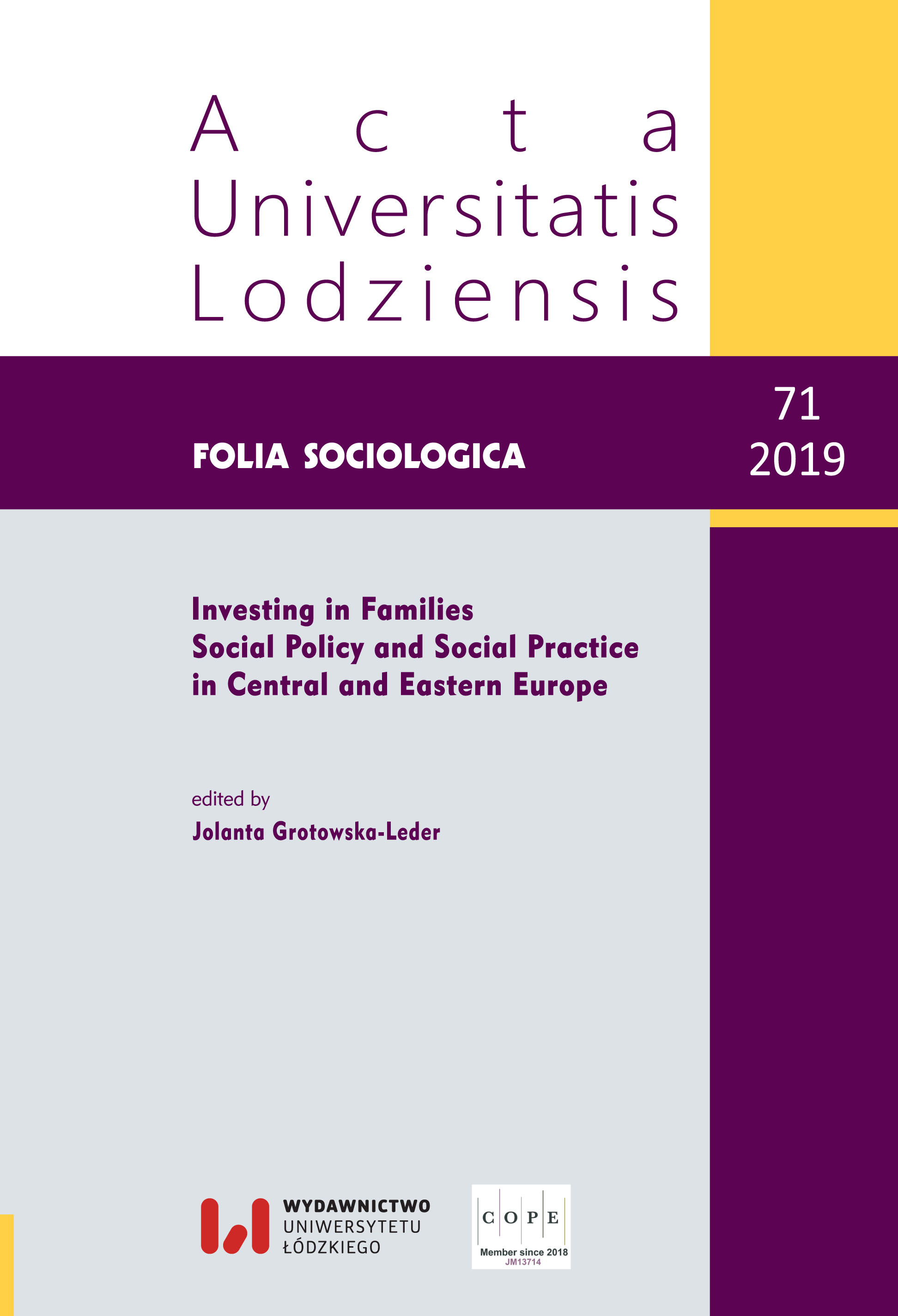Social practices in providing social services for families in Lithuania: day care centers approach
DOI:
https://doi.org/10.18778/0208-600X.71.03Keywords:
interaction, individual work, group work, day care centreAbstract
Despite the considerable number of scientific papers on the importance of interactions between social workers and children in world literature, there are only a few studies and scientific papers in Lithuania that focus on the experience of social workers to interact with vulnerable children. The aim of this article is therefore to analyze the methods of interacting social workers with vulnerable children in daycare centers. Two research questions were formulated: what are the most effective and the least effective methods of interacting with sensitive children in the Vilnius daycare centers. The qualitative methodological approach was applied in the study. The data were collected through semi-structured interviews, which were analyzed using thematic analysis, which allowed for the separation of three main categories: common interaction methods, the most effective methods, and the least effective methods. The qualitative analysis of the data enabled, in turn, to indicate within the subcategories of the various activities to be able to rule on the effectiveness and functionality of group and individual therapy.
References
Bardis P.D. (2014), Social Interaction and Social Processes, “Pi Gamma Mu, International Honour Society in Social Sciences and JSTOR”, no. 54(3), retrieved from: http://www.leedugatkin.com/files/2214/1304/6015/Bardis.pdf (accessed 1.06.2019).
Google Scholar
Calder M., McKinnon M., Sneddon R. (2012), National Risk Framework to Support the Assessment of Children and Young People, retrieved from: http://hub.careinspectorate.com/media/109497/sg-national-risk-framework-to-support-assessment.pdf (accessed 1.06.2019).
Google Scholar
Danlope I. (2016), The Role of Social Interactions in Social Psychology, retrieved from: https://www.linkedin.com/pulse/role-social-interactions-psychology-isaac-danlope (accessed 1.06.2019).
Google Scholar
Espejo K. (2016), The Benefit of Numbers: Group Therapy for Children and Adolescents, retrieved from: https://www.childandfamilymentalhealth.com/the-benefit-of-numbers-group-therapyfor-children-and-adolescents/ (accessed 1.06.2019).
Google Scholar
International Federation of Social Work (2014), Global Definition of Social Work, retrieved from: http://ifsw.org/policies/definition-of-social-work/ (accessed 29.05.2019).
Google Scholar
Miller A. (2018), How Does a Social Worker Interact?, retrieved from: http://work.chron.com/social-worker-interact-21606.html (accessed 1.06.2019).
Google Scholar
Ministry of Social Security and Labour of the Republic of Lithuania (2018), Even More Children Will Be Able to Attend Children’s Day Care Centres, retrieved from: https://socmin.lrv.lt/lt/naujienos/dar-daugiau-vaiku-gales-lankyti-vaiku-dienos-centrus (accessed 29.05.2019).
Google Scholar
Ministry of Social Security and Labour of the Republic of Lithuania (2018), Social Work and Regulation, retrieved from: https://socmin.lrv.lt/en/activities/social-integration/social-servicesand-social-work/social-work-and-regulation (accessed 29.05.2019).
Google Scholar
Ministry of Social Security and Labour of the Republic of Lithuania (2018), Statistic, retrieved from: https://socmin.lrv.lt/lt/veiklos-sritys/seima-ir-vaikai/vaiko-teisiu-apsauga/statistika-1 (accessed 29.05.2019).
Google Scholar
Moffitt K. (2018), Social Interaction, retrieved from: https://study.com/academy/lesson/socialinteractions-definition-types-quiz.html (accessed 1.06.2019).
Google Scholar
Morgan N. (2015), We Humans Are Social Beings – and Why That Matters for Speakers and Leaders, retrieved from: https://www.forbes.com/ (accessed 1.06.2019).
Google Scholar
Morrison F. (2016), Social Worker’s Communication with Children and Young People in Practice, retrieved from: https://www.iriss.org.uk/resources/insights/social-workers-communicationchildren-and-young-people-practice (accessed 1.06.2019).
Google Scholar
Oliver C. (2010), Children’s Views and Experiences of Their Contact with Social Workers: A Focused Review of the Evidence, retrieved from: http://dera.ioe.ac.uk/11515/1/Children_s_views_and_experiences_of_contact_with_social_workers_report_July_2010.pdf (accessed 1.06.2019).
Google Scholar
Research in Practice (2014), Communicating Effectively with Children and Young People, retrieved from: http://fosteringandadoption.rip.org.uk/topics/communicating-effectively/ (accessed 1.06.2019).
Google Scholar
Shemmings D. et al. (2018), Tools Social Workers Can Use to Talk to Children, retrieved from: http://www.communitycare.co.uk/tools-social-workers-can-use-to-talk-to-children/ (accessed 1.06.2019).
Google Scholar
Sinner P. et al. (2018), What are Some Good Approaches to Conducting Focus Groups with Children?, retrieved from: http://www.lse.ac.uk/media-and-communications/assets/documents/research/eukids-online/toolkit/frequently-asked-questions/FAQ-34.pdf (accessed 1.06.2019).
Google Scholar
The United Nations of Children’s Fund (2018), Foundations Working with Children, retrieved from: https://www.unicef.org/violencestudy/pdf/ARC_working_with_children.pdf (accessed 29.05.2019).
Google Scholar
Vilnius City Administration (2019), Vaiku Dienos Centrai, retrieved from: https://www.vilnius.lt/lit/Vaiku_dienos_centrai/9118276 (accessed 29.05.2019).
Google Scholar










